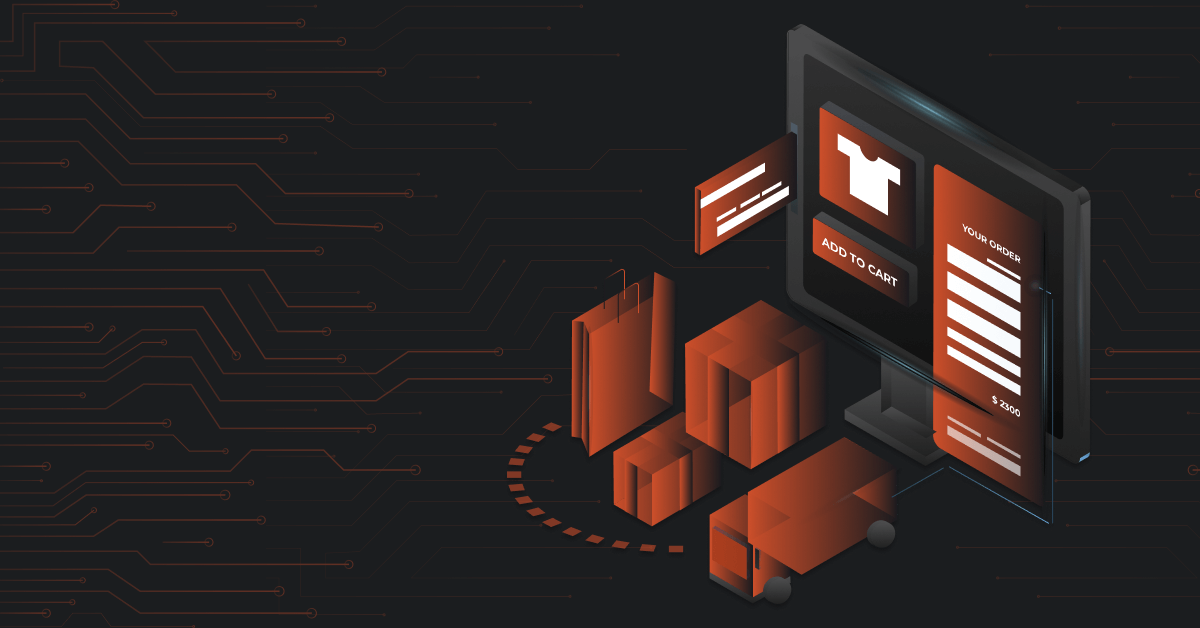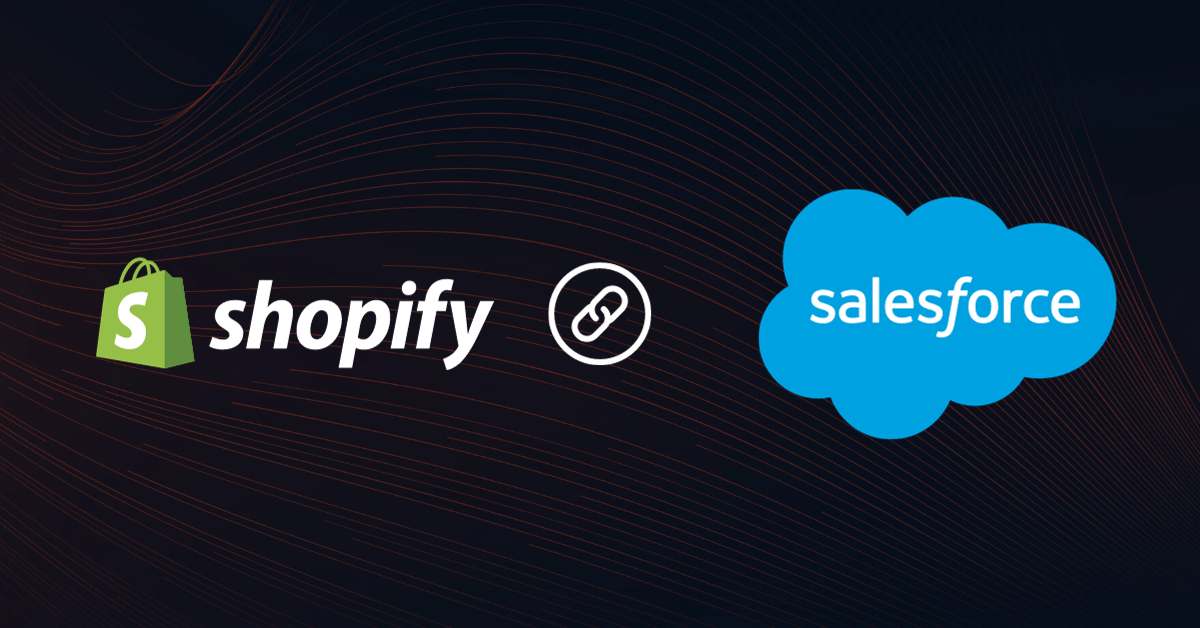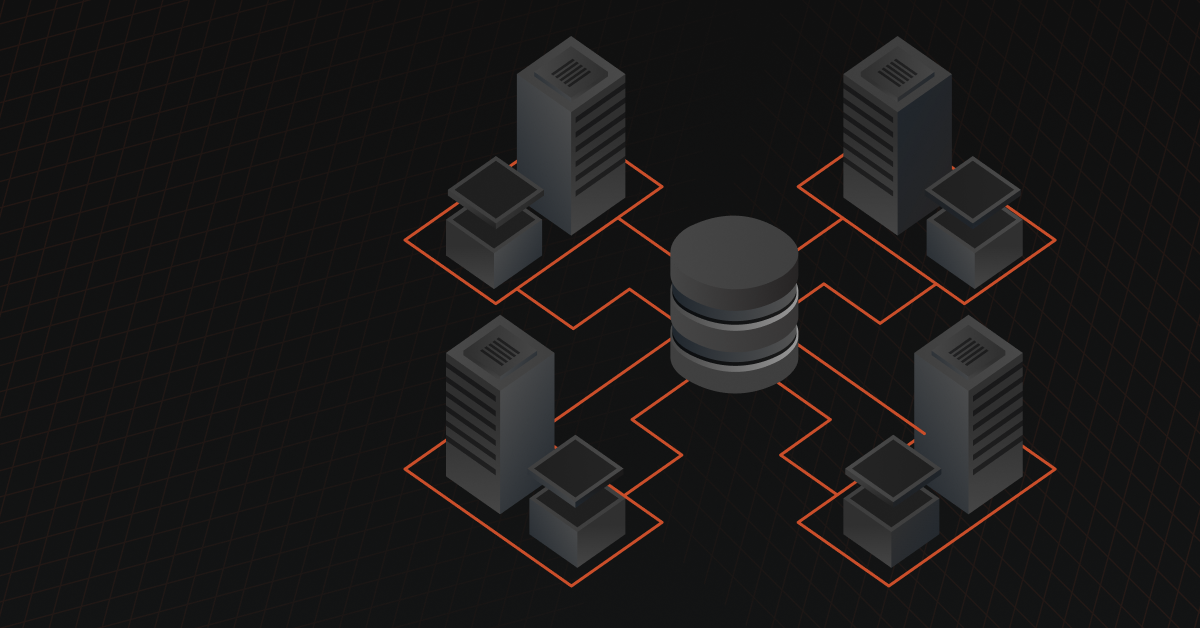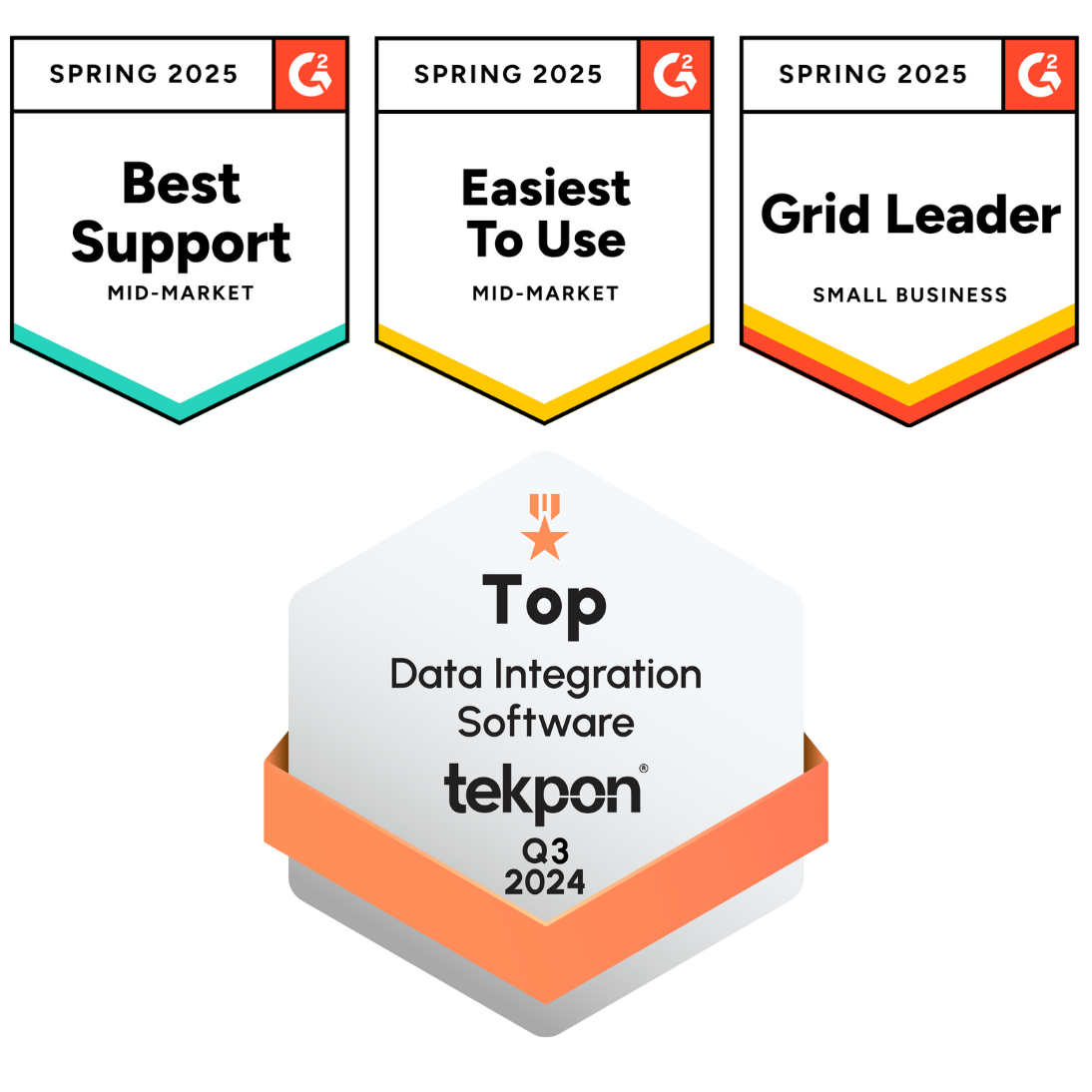eCommerce integration solutions are like the magic wands of online businesses, effortlessly connecting different systems and tools—think of them as the smooth operators that ensure your data flows seamlessly and your operations run with greater efficiency.
Here’s our pick of top ecommerce solutions you should consider while looking to streamline your online business processes:
Top 9 eCommerce Integration Solutions At A Glance:
- DCKAP Integrator
- Zapier
- Integrate.io
- Tray.io
- Celigo
- Boomi
- Jitterbit
- Workato
- Cleo Integration Cloud
Next, let’s delve into more details about each of these solutions.
1. DCKAP Integrator
If you’re a distributor or a manufacturer looking for a game-changing integration solution, allow me to introduce you to a real game-changer – DCKAP Integrator.
DCKAP Integrator takes care of moving data between different places like your CRM and ERP. You don’t need to be a coding expert to connect your web store to other services with it.
It’s easy to use and works really well, making data sharing smooth and simple. The best part here is that this one platform offers seamless integration possibilities from enterprise resource planning and CRM integration to EDI databases integration and more.
The DCKAP Integrator provides a clever way to link different parts of your business processes like your sales, customer info, ecommerce data integration and online store. It works with big systems like Oracle Netsuite, Microsoft Dynamics 365, SAP, Business One, Salesforce, and Sage. This helps everything run smoothly together, eliminating your hassle of choosing multiple connectors.
Here’s a peek into the product:
2. Zapier
If you’re in the business of customer relationships and reaching new heights, Zapier’s CRM and marketing automation services are your secret weapons.
Zapier’s prowess isn’t just reserved for a select few. Whether you’re launching a startup, steering a small or medium business, or captaining an enterprise ship, Zapier has your back. It syncs with over 50 business intelligence apps, along with many of your existing tools.
Zapier connects your CRM and marketing tools so that everything works together. No more manual data transfers or missed opportunities. It automates tasks like lead capture, contact updates, and email campaigns.
Zapier’s integrated systems cover a vast range of Customer relationship management and marketing and social media platforms. It’s like having a universal remote for your business tools.
Related: Understanding eCommerce Integration: Types, Benefits, and Challenges
3. Integrate.io
It is a cloud-based data integration, processing, and analytics product. It’s not just a solution; it’s your full data pipeline toolbox, designed to streamline your operations and make your data work for you.
Let’s say for example you’re using Salesforce as your CRM powerhouse. But your data game doesn’t stop there – you’re also rocking a Shopify store and an ERP system.
Integrate.io waltzes in and connects all these dots. Sales data from Shopify seamlessly integrates into Salesforce, giving you a 360-degree view of your customer interactions.
Integrate.io streamlines Salesforce integration, erasing silos for a unified landscape. Effortlessly juggle data with SETP integration, and merge email, and live chat logs via Rest API (application programming interface) for data harmony.
4. Tray.io
Tray.io is a powerful automation and integration platform that offers a wide range of solutions such as workflow automation, application integration, and data transformation for connecting and automating various software applications.
It is the perfect fit for your business, no matter its size or industry. If you’re looking to boost operational efficiency by automating tasks and connecting various software applications, Tray.io has you covered.
It’s especially beneficial if you want to simplify workflows, get rid of manual data entry, and create custom integrations without needing to be a coding expert.
Whether you’re into a small business, a medium-sized business, or a large enterprise, Tray.io is here to help you enhance your processes and ensure ease of use.
5. Celigo
If you’re looking to connect and sync your software apps effortlessly, Celigo is your go-to solution. It helps your applications work together smoothly, letting data move between them without manual labor. Celigo offers integrations that can extend to connecting POS systems (point of sale systems), enhancing data synchronization between sales and inventory management.
With Celigo, you can simplify intricate implementation tasks, enhance your operations and boost efficiency. Whether you’re looking to integrate your eCommerce platform with tools for finance, CRM, human resources or more, Celigo has the integration solutions you need.
It is particularly beneficial for teams looking to improve data accuracy, eliminate manual data entry, and ensure smooth communication between different systems.
6. Boomi
Boomi is an excellent choice for businesses seeking efficient integration and streamlined workflows across their applications and data sources. It’s suitable for a wide range of industries and company sizes, including startups, mid-sized enterprises, and large corporations.
Boomi offers a comprehensive set of integration solutions, including application integration, data integration, B2B/EDI Integration, API management, workflow automation, and more.
Boomi’s user-friendly interface, pre-built connectors, and drag-and-drop functionality make it accessible to both technical and non-technical users. Whether you’re aiming to optimize processes, improve data accuracy, or enhance customer experiences, a comprehensive set of integration solutions to meet your business needs.
7. Jitterbit
If you’re looking to effortlessly connect various software and data sources, Jitterbit has got you covered. This modern cloud-based platform uses smart tools and AI to help your business bring together data from different places, boosting your decision-making game.
Jitterbit is lightning fast – it speeds up app and API connections, saving you much time. Managing everything is a breeze through its user-friendly web interface, and creating integrations is as easy as a drag-and-drop. Jitterbit is your go-to, whether you’re working with cloud data or your own servers. And if Salesforce or big data is your thing, Jitterbit’s got your back there too.
Its major use cases include purchasing workflow, asset tracking, employee expense management, lead generation, and lead-to-order.
8. Workato
Workato is an integration and automation platform designed to help businesses connect their various applications and automate workflows. Its intuitive interface lets you swiftly create connections. You can securely link up cloud, on-prem databases, legacy apps, and more.
Whether it’s real-time, scheduled, or massive data syncing, Workato’s got it covered. Plus, it’s built on a scalable cloud platform, taking away the hassle of managing infrastructure. Streamline operations and boost collaboration in a more efficient way with Workato by your side.
Workato is ideal for businesses of all sizes looking to optimize their processes. It’s perfect for startups, SMBs, and larger enterprises that want to integrate and automate their software applications without extensive coding. The use cases include application integration, data synchronization, workflow automation, ecommerce integration, HR processes, customer support, social media automation, and business intelligence.
9. Cleo Integration Cloud
Cleo Integration Cloud is ideal for businesses that rely on B2B communications, such as supply chain management, logistics, manufacturing, and retail industries. It helps companies optimize their supply chain processes, enhance partner collaboration, and ensure compliance with industry standards.
The platform supports both cloud-based and on-premises integrations, catering to the needs of different organizations. Cleo Integration Cloud offers solutions for various integration needs, such as EDI (Electronic Data Interchange), application-to-application integration, and data transformation.
Cleo’s B2B integration capabilities could be leveraged to integrate ecommerce platforms with POS systems, enhancing collaboration between online and offline sales channels.
Also see: ERP eCommerce Integration Explained
Top Use Cases of eCommerce Integration Solutions
I. Inventory Management Integration
Integrating eCommerce with inventory systems ensures accurate and real-time tracking of product availability. This prevents scenarios like overselling or stockouts, enhances order fulfillment accuracy, and provides customers with up-to-date information on product availability. By maintaining optimal stock levels, businesses can improve customer satisfaction and reduce fulfillment-related errors.
II. Order Processing Automation
Seamless integration between your eCommerce and order management systems automates the entire order process. When a customer places an order, it flows directly into the order management system, triggering fulfillment processes, shipping notifications, and even invoicing. This reduces manual intervention, speeds up order processing, minimizes errors, and ultimately leads to improved customer satisfaction and operational efficiency.
III. Customer Data Synchronization
Integrating eCommerce with Customer Relationship Management (CRM) systems ensures that customer data is consistent across platforms. This enables personalized marketing efforts, targeted promotions, and better customer service. With a unified view of customer interactions and purchase history, businesses can tailor their communication, offer relevant products, and enhance the overall shopping experience.
IV. Marketing automation
With this integration, you can create personalized and targeted marketing campaigns based on customer behavior, purchase history, and preferences. The eCommerce integration allows data synchronization between your online store and marketing tools, enabling automated email campaigns, product recommendations, abandoned cart reminders, and more.
V. Analytics and Reporting Integration
Integration with analytics tools provides valuable insights into customer behavior, sales trends, and website performance. By analyzing data on customer preferences, browsing patterns, and purchase habits, businesses can make informed decisions about inventory management, marketing strategies, and product offerings. This data-driven approach enhances decision-making, helps identify growth opportunities, and supports overall business strategy.
FAQS
What are eCommerce Integration solutions?
eCommerce Integration solutions are software or tools designed to seamlessly connect and synchronize various systems, applications, and data within an online business ecosystem. They facilitate the exchange of information and processes, enhancing operational efficiency and customer experiences in a much more efficient way.
What are some popular methods for eCommerce Integration?
- Third-Party Middleware/iPaaS: Think of these as all-in-one solutions. Third-party integrations are the ultimate connectors. They join the dots between a whole bunch of apps, making them play all together harmoniously. It’s like having a conductor that keeps your data moving fluidly across the orchestra of your business tools.
- Point-to-Point Integration: This is basically a direct, no-fuss connection between two apps. It’s like a private conversation where data zips between them without any detours. It’s snappy and efficient, but it might become a juggling act as you add more tools to the mix.
- Custom Integration: Think of this as a tailored suit – made just for you. Custom integration is all about building a unique link between your apps. It’s versatile, accommodating your specific needs, but it can take a little more time to stitch together.
What types of systems can be integrated using eCommerce integration products?
eCommerce Integration products can integrate a wide range of systems, such as online marketplaces, shopping carts, payment gateway, inventory management software, CRM software, shipping and logistics platforms, and even third-party applications like email marketing tools.
Why do I need eCommerce Integration solutions for my online store?
eCommerce Integration solutions play a pivotal role in streamlining your business operations. They automate time-consuming tasks such as inventory management, order processing, and customer data management, resulting in improved accuracy and reduced manual effort. By integrating different systems, you can provide a more cohesive and satisfying shopping experience for your customers.
Are eCommerce Integration solutions suitable for businesses of all sizes?
Yes, eCommerce Integration solutions are beneficial for businesses of all sizes, from small businesses to large enterprises. The specific integration needs and complexity may vary, but the fundamental advantages of streamlined operations and enhanced customer experiences apply universally.
How do eCommerce Integration solutions enhance customer service?
Useful eCommerce Integrations contribute to a better customer experience by ensuring real-time inventory updates, accurate data, order tracking, personalized recommendations, and seamless payment processing. This results in quicker, smoother, and more reliable interactions, ultimately leading to higher customer satisfaction and loyalty.
What are back-end systems and front-end systems in an ecommerce store?
Back-end systems play a crucial role in providing seamless customer experiences. They ensure accurate order processing, inventory updates, secure payment transactions, and timely order fulfillment. While Front-end systems encompass the user-facing elements of a business, including websites, mobile applications, and interfaces that customers interact with to browse products, make purchases, and access information.
What are the best practices that ecommerce websites follow to build a reliable customer base?
eCommerce websites adopt a range of strategies such as user-friendly design, secure payment processing, personalized recommendations, and exceptional customer support to establish a loyal and dependable customer base.
How does end-to-end integration visibility benefit retailers that operate both online and offline stores?
Retailers with both online and offline presence can integrate inventory management systems to ensure that inventory levels are consistent across channels, preventing over-selling and providing accurate product availability.
How does customer support software streamline communication between the sales team and customers?
Customer Support Software facilitates direct communication between customers and the sales team. It enables the team to provide real-time assistance, answer product questions, and guide customers through the buying process.
In this Story





